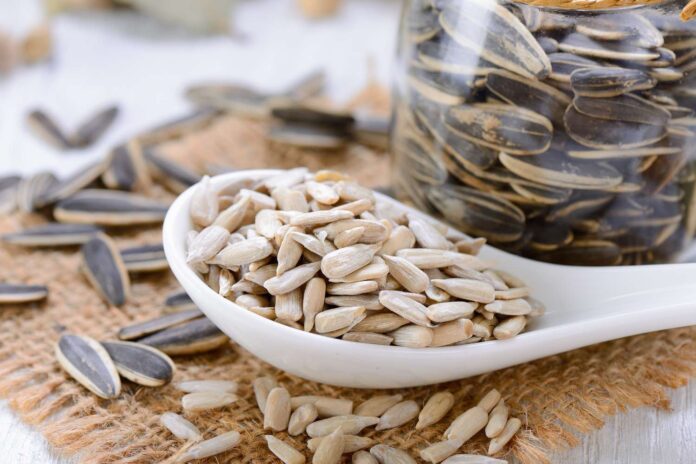Sunflower seeds are a powerhouse of nutrients with several health benefits. Let’s dive into the different aspects:
1. Nutritional Profile
- Rich in healthy fats: Primarily unsaturated fats, which help manage cholesterol levels.
- High in protein: A great plant-based source of protein.
- Loaded with vitamins and minerals:
- Vitamin E: A powerful antioxidant.
- B Vitamins (especially B6 and folate): Essential for energy and brain health.
- Minerals: Magnesium, zinc, iron, phosphorus, and selenium.
Health Benefits of Sunflower Seeds
1. Promotes Heart Health
- Vitamin E acts as an antioxidant, protecting cells from damage.
- Healthy fats like polyunsaturated fatty acids (PUFAs) help lower LDL (bad cholesterol) and maintain healthy blood vessels.
- Magnesium helps regulate blood pressure.
2. Supports Immune System
- Zinc strengthens the immune response.
- Selenium has antioxidant properties, supporting the body’s defense against infections and inflammation.
3. Helps Manage Blood Sugar Levels
- The fiber content slows digestion, preventing sudden spikes in blood sugar.
- Magnesium also improves insulin sensitivity.
4. Improves Skin Health
- Vitamin E promotes healthy skin by preventing oxidative stress, which contributes to aging and skin damage.
- Healthy fats keep the skin moisturized from within.
5. Reduces Inflammation
- Choline, magnesium, and antioxidants reduce inflammation, which helps prevent chronic diseases.
6. Boosts Mood and Brain Function
- Tryptophan, an amino acid in sunflower seeds, helps produce serotonin, improving mood and promoting better sleep.
- Magnesium is known to help with anxiety and mood regulation.
7. Supports Weight Loss
- High in fiber and protein, sunflower seeds help you stay fuller longer, reducing unnecessary snacking.
- Healthy fats provide satiety and energy.
How to Eat Sunflower Seeds
- Snacks: Eat roasted sunflower seeds on their own.
- Salad toppings: Sprinkle them on salads for a crunchy texture.
- Smoothie bowls: Use them in smoothie toppings for added nutrients.
- Trail mixes: Combine with nuts and dried fruits for a healthy snack.
- Baking: Incorporate them in bread, muffins, or cookies.
Potential Downsides
- Portion control is key: Overconsumption can lead to excessive calorie intake due to their fat content.
- Salted sunflower seeds can increase sodium intake, which may not be ideal for people with high blood pressure.
- Allergies: Rare, but some individuals might have allergic reactions to sunflower seeds.
Including sunflower seeds in your diet can provide numerous health benefits, from heart health to better mood. Just keep moderation in mind to fully enjoy their positive impact!



